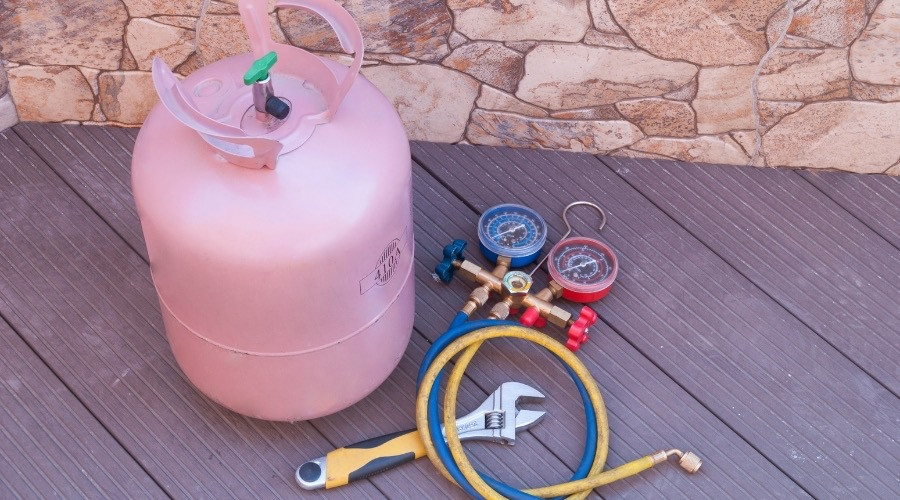Experts in HVAC share insights on refrigerants, symptoms of leaks, and steps to prevent related issues.
Brooklet, United States - July 30, 2025 / Crowe's Comfort Solutions /
Refrigerant and Signs of Refrigerant Issues Explained
A Guide to Refrigerant serves as a comprehensive resource for understanding cooling systems and improving HVAC efficiency. Confusing repair costs and inconsistent performance often stem from refrigerant-related problems. This guide provides details about AC refrigerant, maintenance practices, and warning signs, enabling readers to adopt a proactive approach to system care.
How Refrigerant Works in an Air Conditioning System
Air conditioning refrigerant plays a crucial role in enabling an HVAC system to cool indoor spaces. As a specialized heat transfer substance, refrigerant absorbs indoor heat and releases it outdoors through a closed-loop system that undergoes continuous phase changes between liquid and gas. This process allows efficient heat exchange and climate control.
The cooling process begins when warm air passes over an evaporator coil filled with refrigerant from the air conditioner. As the refrigerant absorbs heat, it evaporates into a low-pressure gas, carrying the thermal energy to the outdoor condenser unit. There, it releases the heat and condenses back into a liquid. This cycle repeats continuously, ensuring indoor temperatures remain comfortable even during peak heat.
Systems using heat pump technology also rely on air conditioning refrigerant to transfer heat in both directions—cooling in the summer and heating in the winter, making them extremely efficient for residential climate systems. Without a properly functioning refrigerant cycle, an air conditioner becomes nothing more than an expensive fan circulating warm air.
Signs of a Refrigerant Leak or Overcharged Refrigerant
 An HVAC system reveals several warning signs when refrigerant levels are not within the correct range. A refrigerant leak may lead to decreased cooling performance, rising energy bills, or even system damage. Recognizing these symptoms early helps prevent long-term complications.
An HVAC system reveals several warning signs when refrigerant levels are not within the correct range. A refrigerant leak may lead to decreased cooling performance, rising energy bills, or even system damage. Recognizing these symptoms early helps prevent long-term complications.
One of the most noticeable signs of low AC refrigerant levels is warm air blowing from vents. Another common symptom includes a frozen evaporator coil, which often forms when insufficient refrigerant fails to maintain correct evaporator temperatures. Additional indicators include hissing or bubbling sounds near the outdoor unit, often caused by refrigerant escaping through compromised lines or connectors.
On the other hand, an overcharged refrigerant system may display similar symptoms, such as reduced cooling performance and higher electricity consumption. Excess refrigerant puts pressure on the compressor, which strains the system and increases the likelihood of failure.
Determining whether the system suffers from a refrigerant leak or an overcharged refrigerant condition typically requires the use of professional diagnostic tools. While leaks may leave oily residue near joints, overcharged systems often lack visible evidence, making expert evaluation essential. Both issues can compromise the system's longevity and effectiveness.
How to Avoid Refrigerant Issues
 Regular maintenance helps prevent refrigerant-related failures and extends the life of the HVAC system. Professional technicians use specialized equipment to detect leaks, verify levels, and ensure safe handling of AC refrigerant. DIY refills often result in overcharged refrigerant, which can damage compressors and reduce performance.
Regular maintenance helps prevent refrigerant-related failures and extends the life of the HVAC system. Professional technicians use specialized equipment to detect leaks, verify levels, and ensure safe handling of AC refrigerant. DIY refills often result in overcharged refrigerant, which can damage compressors and reduce performance.
Preventive care also involves inspecting refrigerant lines, cleaning coils to prevent corrosion, and sealing weak connection points to avoid leaks. Annual or biannual servicing ensures a proper refrigerant balance and minimizes the risks of a refrigerant leak or system inefficiency. Technicians performing refrigerant leak repair use pressure tests, UV dyes, and electronic detectors to identify and resolve leaks before serious damage occurs.
Routine AC maintenance typically includes refrigerant checks, inspection of the frozen evaporator coil, and coil cleaning. These actions support optimal cooling and help identify refrigerant issues before they become more severe. With proactive care, the system remains efficient and avoids emergency repairs caused by air conditioner refrigerant problems.
About Crowe's Comfort Solutions
Crowe's Comfort Solutions is a heating, ventilation, and air conditioning company that provides reliable service in Brooklet and neighboring areas. They offer straightforward pricing and customized services from trusted technicians using the latest technology. Call them today for AC refrigerant leak services in Brooklet, GA.

Contact Information:
Crowe's Comfort Solutions
10559 Hwy 80 East
Brooklet, GA 30415
United States
Kody Crowe
(912) 823-4779
https://crowescomfort.com/

